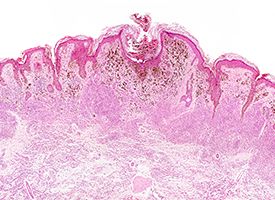Article
Combination BRAF/MEK Inhibition Induces Potent Antitumor Activity in NRAS+ Melanoma
Author(s):
Combining a BRAF inhibitor with a MEK inhibitor causes endoplasmic reticulum stress in BRAF wild-type, NRAS­-mutated melanoma cells, resulting in significant antitumor activity.

Combining a BRAF inhibitor with a MEK inhibitor causes endoplasmic reticulum (ER) stress in BRAF wild-type, NRAS­-mutated melanoma cells, resulting in significant antitumor activity. Speaking at the 16th International Congress of the Society for Melanoma Research, Dana Westphal, PhD, said the 2 inhibitors have only moderate activity at best when used alone, but together they create a powerful synergistic effect.1
“The effects of the MEK inhibitors are in the inhibition of the MAP kinase pathway, the inhibition of proliferation, and the induction of the mitochondrial pathway apoptosis,” said Westphal, a clinical researcher with University Hospital Dresden in Germany. “The effects of the BRAF inhibitors are induction of ER stress. This ER stress is enhancing the proapoptotic activity of the MEK inhibitor. The combination results in very potent antitumor activity in NRAS-mutant melanoma cells.”
Advances with BRAF/MEK inhibition have continued in BRAF-positive melanoma, with recent trials again showing strong activity with the combination approach. For example, updated data from the phase III COLUMBUS trial for the FDA approved BRAF/MEK combination of encorafenib (Braftovi) and binimetinib (Mektovi) showed a median overall survival of 33.6 months versus 16.9 months with the BRAF inhibitor vemurafenib (Zelboraf) in patients with advanced BRAF V600E or BRAF V600K disease (HR, 0.61; 95% CI, 0.48-0.79).2
In other recent positive results in the BRAF-positive setting, findings from the REDUCTOR trial showed that 17 (81%) of 21 patients with stage III/IV BRAF-mutated disease treated with the MEK inhibitor trametinib (Mekinist) and the BRAF inhibitor dabrafenib (Tafinlar) were able to undergo radical resection and 1 patient received microscopic irradical resection. 3 Among 19 evaluable patients, the median recurrence-free survival was 9 months (range, 3-37).
However, up to 20% of melanoma cells harbor an NRAS mutation, which is associated with aggressive disease and shorter survival times. Although the mutation is relatively common, treatment for NRAS-mutant melanoma has lagged far behind BRAF-mutant tumors.4 The rapid antitumor treatment needed to combat the disease does not currently exist, Westphal said.
Westphal and her team wanted to elucidate the mechanism of action for BRAF/MEK inhibition and determine if the combination had efficacy in NRAS-mutated melanoma cells. They created 1 line of NRAS-sensitive cells and 3 lines of NRAS-resistant cells to evaluate the effect of treatment with BRAF/MEK inhibition. The resistant lines were resistant to encorafenib/binimetinib, trametinib/dabrafenib, and vemurafenib plus the MEK inhibitor cobimetinib (Cotellic).
“The sensitive melanoma cells, when they're treated with this inhibitor combination, there is a robust inhibition of proliferation,” Westphal said. “But the resistant cells, they continue to proliferate when they are treated with this combination.”
She added that there may be reactivation of the MAP kinase signaling pathway in the resistant cells. Westphal went on to say that phosphorylation of ERK (p-ERK) was much higher in the resistant cells and that there were remaining p-ERK levels following treatment, which could explain the continued proliferation.
Inhibitor treatment also resulted in “robust” apoptosis induction that was not observed in the resistant cell lines. Westphal said the combination activated several proteins including cytochrome 3 and caspase 3 and 9 in the sensitive cells, resulting in the cleavage of several proteins and triggering mitochondrial apoptosis.
In contrast, resistant cells counteract the effect of MEK inhibition by upregulating p-ERK to reactivate the MAP kinase pathway and by inhibiting apoptosis of the mitochondrial pathway. Furthermore, resistant cells do not counteract the induction of ER-stress caused by BRAF inhibition.
References
- Dinter L, Karitzky P; Kaeubler T, et al. BRAF/MEK inhibitors induce potent ER stress-enforced apoptosis in BRAFwt/NRASmut melanoma cells—insights into mode of action and resistance mechanisms. Presented at: the 16th International Society for Melanoma Research Congress; November 20-21, 2019; Salt Lake City, UT.
- Dummer R, Ascierto PA, Gogas HJ, et al. Overall survival in patients with BRAF-mutant melanoma receiving encorafenib plus binimetinib versus vemurafenib or encorafenib (COLUMBUS): a multicentre, open-label, randomised, phase 3 trial. Lancet Oncol. 2018 Oct;19(10):1315-1327. doi: 10.1016/S1470-2045(18)30497-2.
- Blankenstein SA, Rohaan MW, Klop WMC, et al. Neoadjuvant cytoreductive treatment with BRAF/MEK inhibition of prior unresectable regionally advanced melanoma to allow complete surgical resection: REDUCTOR trial. Poster presented at: 2019 American Society of Clinical Oncology Annual Meeting; May 31-June 4, 2019; Chicago, IL. Abstract 9587.
- Echevarría-Vargas IE, Villanueva J. Combating NRAS mutant melanoma: from bench to bedside. Jakob JA, Bassett RL, Ng CS, et al. NRAS mutation status is an independent prognostic factor in metastatic melanoma. Cancer. 2012;118(16):4014—4023. Melanoma Manag. 2017;4(4):183—186. doi: 10.2217/mmt-2017-0023.
<<< View more from the 2019 International Congress of the Society for Melanoma Research









